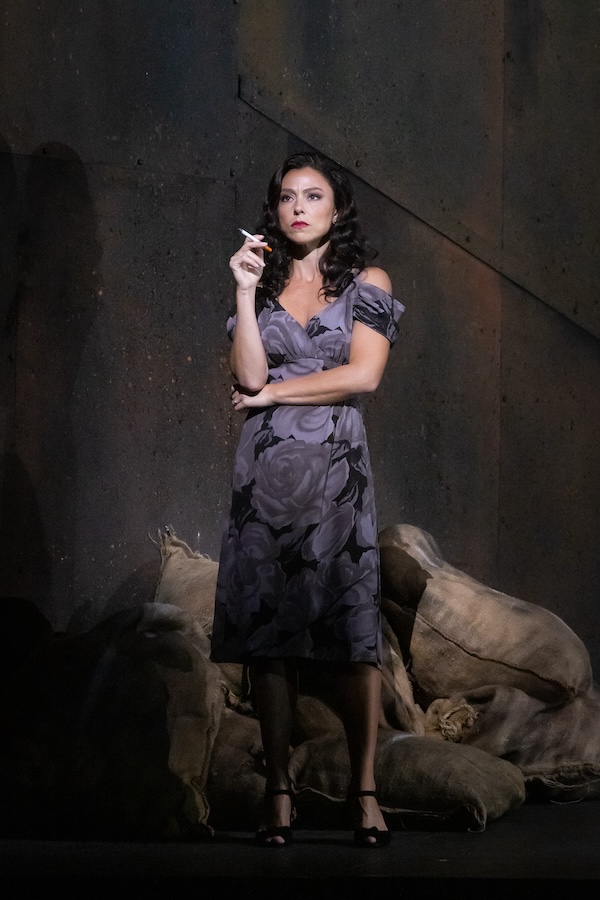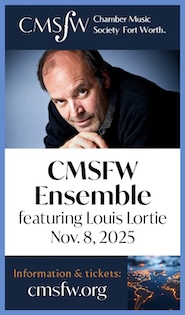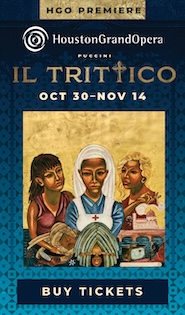Soprano Winters shines brightly in HGO’s Puccini trilogy

Alongside its time-honored mission of commissioning and premiering new works, Houston Grand Opera has in recent years pursued a second goal: introducing its audiences to venerable works it has long overlooked.
The past decade’s examples have ranged from Wagner’s iconic The Ring of the Nibelung to Donizetti’s everywhere-neglected La Favorite—and now Puccini’s Il Trittico.
The company had staged individual parts of the trilogy, but at the Wortham Theater Center on Thursday night, HGO tackled the whole thing: Il Tabarro, a love-triangle thriller; Suor Angelica, a tearjerker centering on a young woman sent to a convent for having a child out of wedlock; and Gianni Schicchi, a comedy about a family that calls on a Figaro-style fixer to help them hang onto a dead uncle’s riches.
The results made up for lost time. HGO put over Il Tabarro’s power, Suor Angelica’s pathos and Gianni Schicchi’s hijinks, and the credit goes first to a versatile handful of singers who morphed among multiple roles as the evening progressed.
A newcomer to the company, soprano Corinne Winters—who won plaudits at New York’s Metropolitan Opera last spring as Puccini’s Mimi —played the leading soprano roles in all three operas. Her anguished Angelica took the evening to its emotional peak.
HGO complemented her with company favorites, prime among them bass-baritone Ryan McKinny and mezzo-soprano Jamie Barton—each of whom has delivered an array of vibrant performances in operas old and new.
In the trilogy’s opener, Il Tabarro, McKinny played Michele, the barge captain who suspects that his wife is unfaithful.
Drawing on the commanding black tones that were so potent when he played John the Baptist in Strauss’ Salome in 2023, McKinny made the brooding Michele as ominous as he was taciturn. And after Michele realized that his wife, Giorgetta, indeed had a lover, McKinny built his climactic monologue—“Nulla! Silenzio”—to a thunderous climax.
Soprano Winters made a convincingly youthful Giorgetta, dancing and joking with Michele’s workers, but her ample voice made her McKinny’s match in vocal impact. When Giorgetta finally had a moment alone with her paramour Luigi, Winters’ singing began capturing the crossplay of Giorgetta’s emotions, from the jittery whispers of anticipation to the outpourings of passion.
Tenor Arturo Chacón-Cruz may not have boasted as beefy a voice as is sometimes associated with Luigi, but he sang with a vibrancy, gleam and projection that put over Luigi’s rueful musings on life as well as his lyrical flights with Giorgetta.
Playing the scavenger Frugola, Giorgetta’s pal, Barton revealed a gift for bubbly joviality rarely glimpsed in previous HGO roles.
As Barton’s smiling Frugola chattered about her beloved cat and her hopes for a peaceful home with her husband, flashes of her voice’s familiar heft peeked through, though. And bass Andrea Silvestrelli—playing Talpa, Frugola’s husband and one of Michele’s stevedores—found a more cheerful use for the booming tones he displayed as the giant Fafner in HGO’s Ring.
Stage director James Robinson kept Tabarro, unlike the trilogy’s next two installments, in its traditional setting of a barge on the Seine, and scenic designer Allen Moyer closed-in set made little more than an embankment visible around it.
That lent a claustrophobic air to the action. But it also meant that the scene-setting figures—such as the song vendor, his customers and the young lovers—were jammed in almost next to the main characters. The cramped staging diminished the main action’s intensity.
Suor Angelica is typically set outside a convent chapel, yet Robinson and Moyer moved it indoors, to a sort of dining room in a children’s hospital. Bright fluorescent lighting replaced the glow of evening sun that the nuns salute so affectionately.
In a display about the production in the lobby, Robinson explained that he wanted Angelica to feel the emotional tension of serving the hospital’s children while she was separated from her own child. Whether that registered in the theater is highly debatable, but Winters brought Angelica to life with such intensity and pathos that the clinical surroundings were almost irrelevant.
Her voice, obviously warmed up, had gained in luster, and its very sound exuded yearning. In the pivotal confrontation between Angelica and her imperious aunt, Winters’ Angelica’s demeanor was at first as still and quiet as her singing—the embodiment of reined-in anxiety. When the outcry finally came, Winters’ voice burst free.
Angelica’s aria, “Senza mamma,” flowed out in poignant, wistful phrases. In the flood of melody that Puccini releases as Angelica imagines a reunion in heaven with her son, Winters’s voice blossomed, vaulting aloft in gleaming tones. The nuns’ chorus welled up richly alongside her.
Playing Angelica’s aunt, the Princess, Barton exuded hard-heartedness. Her demeanor was aloof and imperious, her voice full-throated but devoid of warmth. Yet Barton also let loose with a lyrical outpouring when the Princess described her visions of communicating with Angelica’s late mother.
Director Robinson moved Gianni Schicchi from the Florence of 1299 to that of the 1950s. The doomed old man’s sickroom was covered floor-to-ceiling in an eye-popping black-and-white geometric pattern, and off to the side stood an iron lung machine. (When was the last time you saw one of those onstage?)
Yet the outlandish setting suited the farcical comedy. Robinson kept the action bustling, and HGO’s entire cast threw themselves into the antics.
Bass-baritone McKinny returned to the stage as Schicchi, summoned by the family to figure out how they can get their hands on the dearly departed’s fortune. McKinny could hardly have cut a more different figure than in Tabarro. His Schicchi was animated and voluble, exuding wiliness with every word. Once in a while, though, McKinny let loose his voice boom, all for boisterous effect.
Winters now played Schicchi’s daughter, Lauretta, delivering the score’s most-famous number—“O mio babbino caro”—in generous phrases that benefited from her voice’s innate sound of yearning. As Lauretta’s sweetheart, Rinuccio, Chacón-Cruz’s youthful tones and vitality animated his aria celebrating Florence.
Among the members of the money-hungry clan, Barton was a picture of comic conniving as Zita. Playing Simone, the family’s oldest member, Silvestrelli and his copious voice lent more oomph to the hijinks.
Last but not least, conductor Patrick Summers and the HGO Orchestra brought vividness, atmosphere and life to all three stories. The orchestra shaped the darkness and foreboding that hang over Il Tabarro, the aura of religious transport that wells up in Suor Angelica and the quicksilver humor that fills Gianni Schicchi.
Summer and company made melodies surge, but they also savored little touches, such as the meowing-cat woodwinds that punctuate Frugola’s homage to her tabby in Tabarro. Puccini’s trilogy had to wait more than a century to come to Houston, but HGO by and large gave it the showcase it deserved.
Il Trittico runs through November 14. houstongrandopera.org


